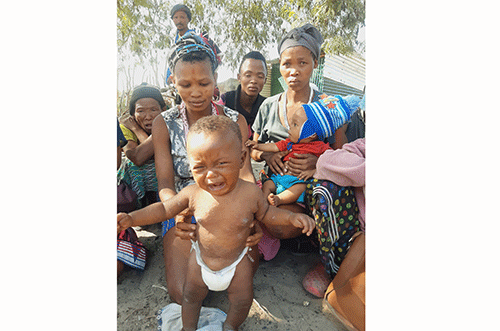ONGWEDIVA – A health team has been deployed to the Omalapapa village of the Ohangwena region, where members of the San community residing there have been battling scabies for the past two months.
Health director in the Ohangwena region Johannes Hango became aware of the outbreak only when approached by this publication on Thursday.
He told New Era his office will immediately send a team of health workers to assess the situation at Omundaungilo.
The elderly, youths and toddlers have developed wounds on their bodies from scratching to relieve itching.
Scabies is an infestation of the skin by the human itch mite.
This community resides in structures made from discarded plastic sheets and sticks at Omapundo (the common name in Oshiwambo to refer to their settlement) in the Omundaungilo constituency.
Head of Omapundo and eldest member of the communityHelaria Haule (88) said she has been battling with scabies for one month.
“We never went to hospital. We just use herbs from the forest to treat ourselves, but it’s not helping,” Haule told New Era.
Haule said they were never infected by scabies since 1976 when she came to that village.
Helena Hamutenya said all her four children, including a four-month-baby, are infected with scabies.
“It is not easy for a toddler to be infected by scabies. My son is always crying whenever he itches,” she said.
The community claims their constituency councillor Festus Ikanda failed to inform the health director in the region about the scabies outbreak.
They now allege discrimination by their councillor, whom they said turned a blind eye on them and refuses to hear their plight.
Approached for comment, Ikanda said he is not aware of the scabies outbreak.
“I have no information regarding scabies in my constituency,” he added.
Also speaking to New Era, medical practitioner at the Windhoek Central Hospital Dr Laimi Ashipala said scabies is found worldwide and affects people of all races and social classes.
“It can spread rapidly in crowded conditions, where close body and skin contact is frequent, such as prisons, hostels and squatter camps,” she explained.
Ashipala said the symptoms of scabies are intense itching, especially at night, and a pimple-like skin rash.
The itching and rash may affect the whole body or be limited to common sites, such as the wrist, elbow, armpit, webbing between the fingers, nipple, penis, waist, belt-line and buttocks.
“The rash sometimes includes tiny blisters (vesicles) and scales. Scratching the rash can cause skin sores – and sometimes, these sores become infected by bacteria. The head, face, neck, palms and soles are often involved in infants and very young children, but usually not adults and older children,” she explained.
“It is spread by direct, prolonged, skin-to-skin contact with a person who has scabies. It is spread easily to sexual partners and household members. Scabies is sometimes spread indirectly by sharing items such as clothing, towels or bedding used by an infected person. Indirect spread can occur easier when the infested person has crusted scabies. A quick handshake or hug will not usually spread scabies,” she stressed.
Scabicides to treat human scabies are available only with a doctor’s prescription.
– fhamalwa@nepc.com.na


